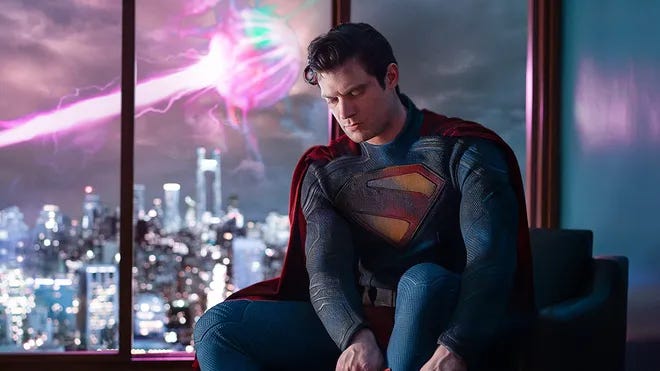Kindness Is Punk Rock: A Humble, Questioning Superman
In case you didn’t read my last post about James Gunn’s Superman, you should know, I'm writing a rebuttal to myself. I don’t want you to think that the recent iteration had nothing good to offer, so I’m going to give you the other side of the argument, and a side I think has merit. Watching James Gunn's new Superman, I find myself considering why his particular brand of heroism might be exactly what we need right now.
The Power of Questions Over Answers
What strikes me most about Gunn's approach is how he transforms Superman from a figure of unwavering certainty into someone who genuinely wrestles with doubt. This isn't the deity of previous iterations, but rather a hero who, as David Corenswet puts it, faces each day by "simply putting one foot in front of the other". The film opens with Superman literally broken and bloodied, calling for help—a radical departure from the invincible archetype we've grown accustomed to.
Critics have noted that this "weakness" actually proves Gunn's deeper understanding of the character. As one reviewer observed, "Superman being shown as 'weak' exemplifies this perfectly... in showing Superman's 'weaker' moments, James Gunn is showing the hero at his most human". This vulnerability isn't a flaw—it's the foundation of authentic heroism.
The Theology of Kindness
Gunn has described his Superman as fundamentally about "basic human kindness" and suggested this is "something we have lost". In our current cultural moment, where cynicism has become the default posture and kindness is often dismissed as naivety, this feels almost prophetic. As one critic noted, "Superman is a kind-hearted individual who wishes to show kindness. When you perceive the world through Superman's perspective, everyone appears beautiful".
This emphasis on kindness as a countercultural force resonates with theological themes about the radical nature of love in a broken world. Gunn's Superman doesn't just save people from physical danger—he saves them from despair about human nature itself. As the film suggests, "kindness is punk rock", which perfectly captures how genuine goodness can be an act of rebellion against societal expectations.
The Immigrant's Journey
One of the most compelling aspects of Gunn's interpretation is how he embraces Superman's identity as an immigrant story. "Superman is the story of America," Gunn explains, "an immigrant that came from other places and populated the country". This isn't mere political messaging—it's a return to the character's roots, created by the children of Jewish immigrants who understood what it meant to be an outsider seeking belonging.
The film's exploration of Superman's struggle with his Kryptonian heritage parallels the immigrant experience of navigating between old and new identities. As one reviewer noted, "Having the world question Superman's kindness and his willingness to do the right thing is exactly what would happen today if we saw a bright and optimistic being trying to do good". This reflects the contemporary reality where good intentions are often met with suspicion and altruism is questioned.
The Courage to Be Vulnerable
Perhaps most importantly, Gunn's Superman demonstrates that true strength comes through vulnerability, not despite it. David Corenswet's performance captures this—he presents a hero who, as one critic observed, "embodies the earnestness and hopefulness of the Man of Tomorrow, lending him gravitas in the moments that matter and being just as dorky and optimistic as 'Big Blue' should be".
Vulnerability isn't weakness—it's the prerequisite for authentic connection. A Superman who struggles, who questions himself, who needs help from others, is a Superman who can genuinely inspire rather than simply intimidate. As one reviewer noted, "the hero's empathetic and sincere approach to solving problems" is what makes both the film and the character endearing.
The Power of Hope in Dark Times
Critics have consistently praised the film's commitment to hope without naivety. As one review observed, "In an era saturated with dark anti-heroes, Superman is refreshingly idealistic—not in a saccharine way, but in a way that feels rebellious, even radical". This is crucial for our current moment, where cynicism often masquerades as wisdom and hope is dismissed as foolishness.
The film's political subtext—addressing immigration, media manipulation, and the abuse of power—feels remarkably current. Yet it never loses sight of its central message: that individual acts of kindness and courage can matter, even in the face of systemic problems. This is the kind of hero we need—not one who provides easy answers, but one who models the courage to keep asking the right questions.
From a theological perspective, Gunn's Superman embodies what we might call an "ecclesial" understanding of heroism—one that recognizes the necessity of community. The film deliberately places Superman within a broader network of heroes (the "Justice Gang"), emphasizing that even the most powerful among us cannot—and should not—work alone. This reflects a mature understanding of both leadership and service.
The film's emphasis on journalism and truth-telling highlights the need of Christians to bear witness. As Rachel Brosnahan noted, "One of the joys of stepping into this role has been gaining a deeper understanding of what journalists do and the risks taken in pursuit of truth". In an era of misinformation and competing narratives, the commitment to truth is a necessary ministry for every Christians
The Hero We Need
James Gunn's Superman succeeds because it understands that heroism isn't about having all the answers—it's about having the courage to keep asking the right questions while treating others with dignity and compassion. This Superman doesn't stand above humanity; he stands among us, showing us what we could be if we chose kindness over cynicism, hope over despair, and connection over isolation.
In a world that often feels broken beyond repair, we need heroes who acknowledge the brokenness while still believing in the possibility of redemption. We need leaders who demonstrate strength through vulnerability, who show us that questioning our certainties isn't a sign of weakness but of wisdom. Most of all, we need reminders that basic human kindness—the kind that sees the image of God in every person—isn't naive idealism but the most radical force for change available to us.
This is the Superman our moment requires: not a distant deity, but a humble, questioning, profoundly human hero who reminds us that the greatest power isn't the ability to move mountains, but the willingness to help our neighbors carry their burdens. In embracing this vision, Gunn has given us not just a superhero movie, but a meditation on what it means to be truly heroic in times like these.



